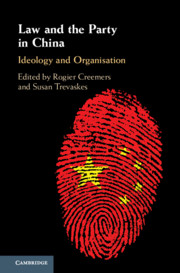Book contents
- Law and the Party in China
- Law and the Party in China
- Copyright page
- Contents
- Contributors
- Abbreviations
- 1 Ideology and Organisation in Chinese Law
- Part I Ideology and the Party in Law
- 2 Party Ideology and Chinese Law
- 3 Making Sense through Ideology
- 4 The Conception of Legality under Xi Jinping
- 5 Law–Morality Ideology in the Xi Jinping Era
- Part II Ideology and the Party in Law and Organisation
- Glossary of Chinese Terms
- Index
- References
3 - Making Sense through Ideology
from Part I - Ideology and the Party in Law
Published online by Cambridge University Press: 17 December 2020
- Law and the Party in China
- Law and the Party in China
- Copyright page
- Contents
- Contributors
- Abbreviations
- 1 Ideology and Organisation in Chinese Law
- Part I Ideology and the Party in Law
- 2 Party Ideology and Chinese Law
- 3 Making Sense through Ideology
- 4 The Conception of Legality under Xi Jinping
- 5 Law–Morality Ideology in the Xi Jinping Era
- Part II Ideology and the Party in Law and Organisation
- Glossary of Chinese Terms
- Index
- References
Summary
Gloria Davies’ chapter focuses on two aspects of ideology that help to determine how we can look at law in China. She contrasts two different ways of thinking about ideology, one implicit and the other explicit. She first considers how the disciplinary rules and conventions of academic work sustain the discursive dominance of certain patterns of understanding. Second, she looks at the dominance of ideology under Xi Jinping, particularly how it has worked to undermine academic inquiry in China in some areas and to produce a more explicitly political understanding of China’s ‘socialist rule of law’ in others. With these issues in mind, she explores Party ideology as a cultural and linguistic phenomenon of China’s Party-state system. She argues that to the extent that ideology is shaped by spoken and written communications, texts and images, its imprint as a dominant pattern of understanding is contingent as much on the persuasiveness of what it promises and represents as on its institutional entrenchment.
- Type
- Chapter
- Information
- Law and the Party in ChinaIdeology and Organisation, pp. 64 - 96Publisher: Cambridge University PressPrint publication year: 2021



